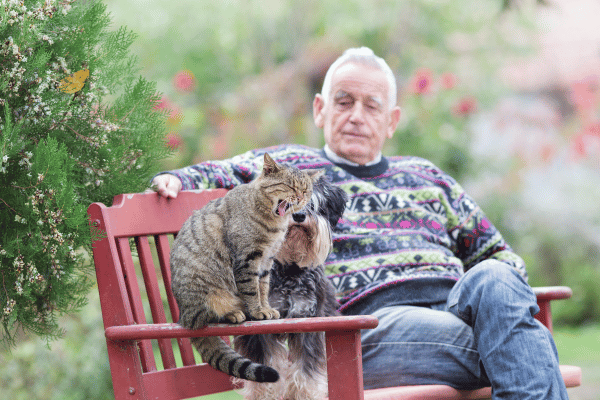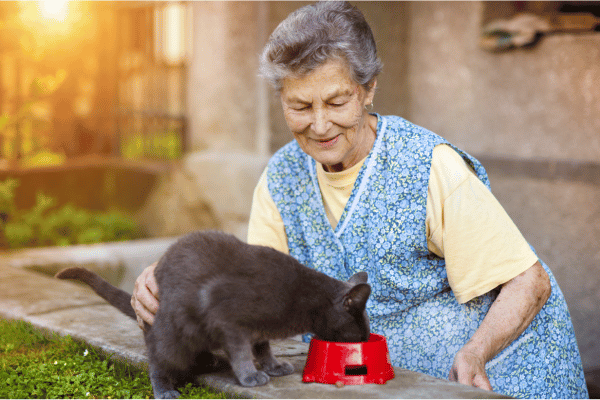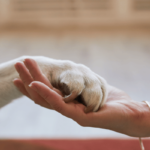Caring for a senior pet requires understanding and patience. As pets age, their needs change significantly. This article, drawing from over 25 years of experience in pet care and veterinary advice, focuses on Senior Pet Care Tips to ensure your aging companions remain active and healthy. We’ll explore essential care strategies, emphasizing the unique needs of older pets.
Enhancing Comfort for Aging Companions

As pets enter their golden years, comfort becomes paramount. Start with a cozy, accessible bed that supports their joints. Senior pets often struggle with mobility, so consider non-slip flooring to help them navigate your home safely. Additionally, keep essential resources like food, water, and their favorite resting spots within easy reach to minimize strain.
Regular veterinary check-ups are crucial for senior pet care. These visits can catch early signs of common age-related issues, such as arthritis or dental problems. Your vet can also recommend dietary adjustments to suit their changing nutritional needs, ensuring they maintain a healthy weight and receive all necessary nutrients.
Mental stimulation remains vital for aging pets. Simple activities, tailored to their mobility level, can keep their minds sharp. Puzzle feeders, gentle play sessions, and short, leisurely walks can significantly enhance their quality of life. Remember, the goal is to keep them engaged and content, without overexerting them.
Tailoring Exercise for Senior Pets
Exercise for senior pets should be gentle yet consistent. Tailor activities to their individual health and stamina. Swimming, for instance, is excellent for those with joint issues, offering low-impact yet effective exercise. Start with short sessions, gradually increasing as tolerated, always observing their response to ensure they’re comfortable and enjoying themselves.
Nutrition plays a pivotal role in managing the health of older pets. Opt for senior-specific pet food that supports their aging bodies. These formulations typically contain higher fiber for digestive health and are lower in calories to help maintain an ideal weight. Consult with your vet to select the best option for your pet’s specific needs.
Senior pets may require more attention to their emotional well-being. They can become more sensitive to changes in their environment or routine. Maintain a stable, peaceful home environment and spend quality time together. This connection can help alleviate anxiety and promote a sense of security, reinforcing the bond between you and your pet.
Senior Pet Care Tips for Longevity
Preventative care is the cornerstone of extending the quality and duration of your senior pet’s life. This includes regular dental care to prevent diseases that can affect their overall health. Brushing their teeth or using dental treats can significantly reduce the risk of dental issues, which are common in older pets.
Environmental adaptations can greatly benefit senior pets. For cats, consider litter boxes with lower sides for easy access. For dogs, ramps or steps can help them reach their favorite spots without jumping or straining. These small changes can make a big difference in their daily comfort and mobility.
Finally, never underestimate the power of love and attention. Senior pets often require more reassurance as they navigate the challenges of aging. Regular grooming, petting, and talking to them can enhance their well-being. It’s also a chance to check for any new lumps, bumps, or changes in their coat, which could indicate health issues.
Managing Health Issues in Older Pets
As pets age, vigilance in observing health changes is key. Early detection of conditions like kidney disease, thyroid issues, or diabetes can make a significant difference in management and outcomes. Regular blood tests and health screenings become increasingly important, helping to catch potential problems before they escalate.
Pain management is a critical aspect of caring for a senior pet. If your pet shows signs of discomfort or decreased mobility, consult your veterinarian for a pain management plan. This may include medications, supplements, or alternative therapies such as acupuncture, all aimed at improving their quality of life.
Adjusting your home to better accommodate your senior pet’s needs can greatly enhance their comfort. Keep their living area warm and draft-free, as older pets are more susceptible to cold. Additionally, consider orthopedic bedding to support their joints and make resting more comfortable.
Fostering a Stimulating Environment

Keeping your senior pet mentally stimulated is as crucial as physical health. Engage them with interactive toys or new, gentle games to keep their mind sharp. For cats, window perches can offer hours of entertainment. For dogs, scent games can stimulate their sense of smell, providing mental engagement without the need for intense physical activity.
Social interaction plays a vital role in the emotional health of senior pets. If they enjoy the company of other animals, arrange for safe, gentle playdates. For pets that prefer human company, simply being in the same room with you can be comforting. Remember, the goal is to keep them feeling connected and engaged with their surroundings.
Routine is comforting for senior pets, but slight variations can help keep their environment stimulating. Changing the layout of their room or introducing new bedding can provide a sense of novelty. Always introduce changes gradually to avoid stress, ensuring they feel safe and secure in their familiar space.
Customizing Diet for Senior Pets
As pets age, their dietary needs evolve. A balanced diet tailored to their specific health requirements is essential. Incorporate foods rich in omega-3 fatty acids to support joint health and cognitive function. Consult with your veterinarian to customize a diet plan that addresses your pet’s unique needs, ensuring they receive all necessary nutrients.
Hydration is particularly important for senior pets, as they are more prone to kidney issues. Ensure they have constant access to fresh water, and consider incorporating wet food into their diet to increase fluid intake. Monitoring their water consumption can also provide early indicators of health issues.
Be mindful of your senior pet’s appetite and weight. Changes in eating habits can signal health problems. Regularly weigh your pet to monitor for any significant weight loss or gain, and adjust their diet accordingly. A healthy weight is crucial for minimizing the strain on aging joints and organs.
Prioritizing Comfort in Senior Pet Care

Comfort is paramount for senior pets. This extends beyond physical comfort to include emotional and environmental aspects. Ensure their sleeping area is quiet, warm, and free from drafts. Soft bedding that cushions their joints can make a significant difference in their comfort levels.
Consider the layout of your home from your pet’s perspective. Remove obstacles that could pose a challenge to their mobility, and ensure they can easily access their favorite spots. If your pet has difficulty climbing stairs, ramps or stairlifts can be invaluable aids.
Regular grooming is more than just keeping your pet looking their best; it’s also about maintaining their skin and coat health. Brushing helps distribute natural oils, which is especially important as they may not groom themselves as thoroughly as they once did. It also provides an opportunity to check for any new lumps, bumps, or skin issues.
Senior Pet Care Tips for Everyday Joy
Daily joy and quality of life are the heart of senior pet care. Celebrate the small moments, whether it’s a gentle walk in the park or simply relaxing together at home. Recognize and adapt to their changing needs, always looking for ways to make each day fulfilling.
Keep communication open with your veterinarian, especially as new challenges arise. They can offer invaluable advice and support, from dietary recommendations to managing chronic conditions. This partnership is crucial in navigating your pet’s senior years with confidence and care.
Finally, cherish the time you have with your senior pet. Each day is a gift, and your ongoing attention and adaptation to their needs can significantly enhance their golden years. Remember, the goal is to provide a loving, comfortable environment where they can thrive at any age.
Building a Supportive Community for Seniors
A supportive community can be a tremendous resource for owners of senior pets. Engaging with online forums, local pet groups, or veterinary clinics can provide valuable insights and emotional support. Sharing experiences and tips with others facing similar challenges enriches your care approach and fosters a sense of belonging.
Educational resources, such as workshops or webinars focused on senior pet care, are invaluable. These can cover a range of topics, from nutritional advice to understanding behavioral changes. Staying informed helps you make the best decisions for your pet’s health and well-being.
Don’t hesitate to seek out specialized services that cater to senior pets, such as pet sitters experienced with older animals or grooming services that offer gentle care. These professionals can provide not only services but also advice on enhancing your pet’s comfort and quality of life.
Embracing the Golden Years Together

Embracing the golden years with your pet means adapting to their changing needs with grace and love. It’s about finding joy in the slower moments and appreciating the unique bond you share. Simple adjustments to your daily routine can make a significant difference in their comfort and happiness.
Remember, aging is not a disease but a natural part of life. With the right care, senior pets can continue to lead fulfilling lives. Pay close attention to their health, comfort, and emotional well-being, adjusting your care strategies as their needs evolve.
Your senior pet’s journey is a shared adventure, filled with moments of both challenge and immense reward. By prioritizing their well-being, you ensure that their senior years are filled with love, comfort, and the highest quality of life possible. Let’s cherish and honor these special times with our faithful companions.
Celebrating Life with Senior Pets
Caring for senior pets is a journey of love, patience, and understanding. Throughout this article, we’ve explored Senior Pet Care Tips, emphasizing the importance of tailored nutrition, comfortable living arrangements, and regular veterinary care. These elements are crucial for maintaining their health, happiness, and quality of life as they age.
Remember, each senior pet is unique, requiring personalized care to meet their specific needs. Regular check-ups, a balanced diet, and a comfortable, stimulating environment can significantly impact their well-being. Engaging with a community of pet owners and professionals can also provide support and valuable insights.
The bond between pets and their owners deepens with time, becoming ever more precious in the senior years. Cherish every moment, adapting to their changing needs with compassion and understanding. Your efforts will ensure that your beloved companion enjoys a fulfilling, joyful life, regardless of their age. We encourage you to continue exploring ways to enhance your senior pet’s life. Whether through further reading on sites like Catster for insights on elderly cat care or engaging with local pet communities, every step you take enriches your journey together. Let’s celebrate the golden years of our pets with love, care, and joy.
Page Reference: How to Care for Senior Cats: 12 Vet-Approved Tips
III. Frequently Asked Questions About Dog and Cat Behavior
- Do dogs and cats feel emotion?Both dogs and cats are capable of feeling a range of emotions, such as joy, fear, and affection, though they may express these feelings differently.
- Do cats and dogs feel love?Yes, cats and dogs can feel love and attachment towards their owners and sometimes each other, often demonstrated through their behavior and body language.
- Do dogs feel emotions?Dogs are known to experience various emotions, including happiness, anxiety, and affection, often clearly communicated through their actions and vocalizations.
- Do cats and dogs feel sadness?Cats and dogs can feel sadness, especially in response to changes in their environment, loss of a companion, or lack of attention and care.
- Can dogs and cats read each other?Dogs and cats can learn to read each other's body language and signals over time, which can help them understand and predict each other's behavior.
- Can cats interact with dogs?Cats can interact with dogs, and with proper introductions and positive experiences, they can engage in playful or companionable behavior.
- Does my dog know my cat isn't a dog?Dogs can distinguish cats from other dogs through scent, body language, and vocalizations, recognizing them as a different species.
- Can a dog become friends with a cat?Yes, a dog can become friends with a cat, especially if they grow up together or are introduced properly, developing a bond through shared experiences.
- Why does my dog go crazy for cats?A dog might go crazy for cats due to their natural predatory instincts, excitement, or lack of socialization with cats, leading to high arousal when seeing a cat.
- Why does my dog get so excited about cats?Dogs may get excited about cats due to curiosity, predatory drive, or the novelty of encountering another animal, especially if they are not used to being around cats.
- Dogs may get excited about cats due to curiosity, predatory drive, or the novelty of encountering another animal, especially if they are not used to being around cats.Dogs may get triggered by cats due to instinctual prey drive, territorial behavior, or previous negative experiences with cats, leading to heightened reactions.
- Why do dogs terrorize cats?Dogs might terrorize cats out of predatory instinct, lack of proper socialization, or misunderstanding of cat signals, leading to aggressive or overly playful behavior.

Join Dan Morgan at dwfocus.com, your hub for ‘4 paws and owners’ wisdom! Explore a world where pet care meets expert insights, crafted by Dan, a seasoned vet with a heart for animals. Engage with stories, tips, and advice that every pet owner needs. From playful pups to graceful cats, Dan Morgan guides you through the joys and challenges of pet parenting. Embrace your love for pets with Dan’s expert guidance on dwfocus.com. #4PawsAndOwners #DanMorganPetExpert #dwfocus







